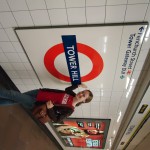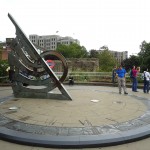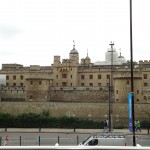Our destination was the Tower Hll tube Station. Tower Hill is in the borough of the Tower Hamlets, toward the East End of the city. From the hotel, we walked to the Goodge Street Station, located on Tottenham Court Road, and took the black Northern Line to Embankment. From there we took the green District Line to Tower Hill. The tube was not like the subway system that New York City uses. It is cleaner and less noisy. The only people talking on the train were people obviously travelling together or children. Almost none of the riders seemed to be in a rush, but they moved at a consistent, comfortable pace. This first journey took us about 25 minutes.
When we walked above ground at the Tower Hill Station, there were many things that quickly grabbed our attention. Firstly, there was a gigantic sundial. It was a monument. Across the street from the sundial platform, we could see the Tower of London built by the Normans to protect the port of London. Today it houses many exhibits of British history, including the crown jewels. Also located at the Tower Hill station is a piece of the old Roman wall, which marked the original city boundary. On the other side of the sundial platform, there was a monument dedicated to the sailors who sacrificed their lives during World War II.
The sundial has a surprising, almost hidden, meaning. Around the base, where the dial’s shadow casts down, images of London’s history are portrayed. Events such as the founding of the Tower of London in 1066, Shakespeare’s arrival in the city, the Great Fire of 1666, and the Blitz are artistically represented. The sundial is in this location because of all the history that surrounds it. The old Roman wall, the Tower Bridge, and the Tower of London attracts tourists and the sundial is a guide through the different ages of the city. Though initially we did not recognize the images around the sundial’s base, and others seemed to not notice them, people took pictures with the big dial.
Most of the people in this location seemed to be tourists. They interacted with the monuments by taking pictures of them or with them. There was an ice cream vendor on the street that drew groups of parents and children. A sign explaining why scaffolding covered parts of the tower supports the notion that this location is a large tourist attraction. The rest of the people seemed to be people traveling home from work who paid no attention to the monuments.
We took an alternate route home. This time, we traveled from the Tower Hill Station to Monument, where we switched to the red Central Line to take us back to Tottenham Court Road. This journey took us significantly longer, almost 40 minutes. This may have been caused by the start of the evening rush home from work. We noticed a lot more passengers in business dress with briefcases on the journey home. These passengers did not talk much either, but it was clear that they took the same route home routinely every day: they seemed almost robotic. Also, it was a really long walk from when we got off on the platform at Monument to the platform where we could get on the Central Line. We went down two long steep escalators, and back up two long steep escalators. Finally, the Tottenham Court Road Station is farther from Gower Street and the Arran house than Goodge Street Station.
Discovering Tower Hill Station- David Hatzopoulos & Kaitlin Lilienthal
August 26, 2010 · 1 Comment
Categories: 2010 David · 2010 Kaitlin · Uncategorized




1 response so far ↓
Karl // Aug 26th 2010 at 16:39
Good job. When you edit, add categories and tags. You’ll also need to rotate photos before posting. You could also add helpful links for your readers, such as link to the Tower of London, etc.
You must log in to post a comment.